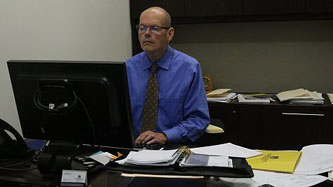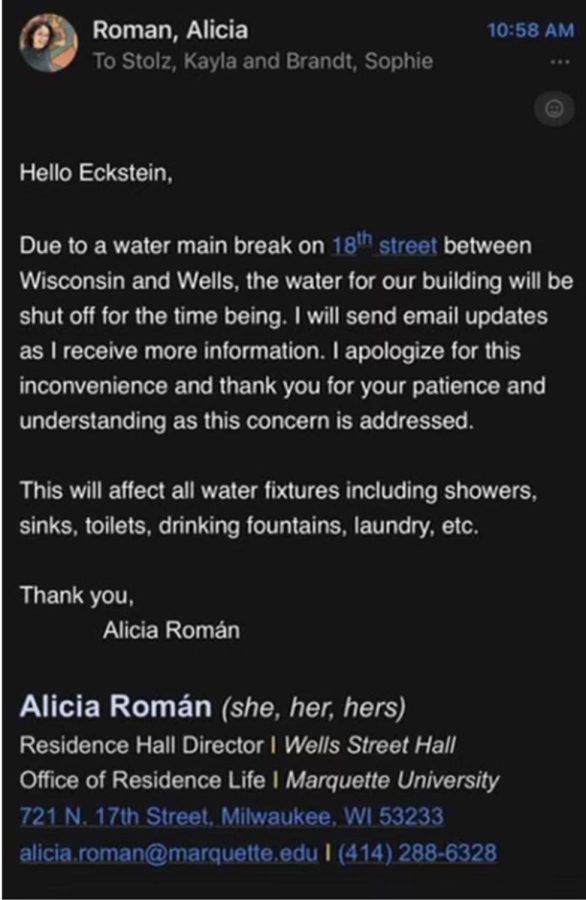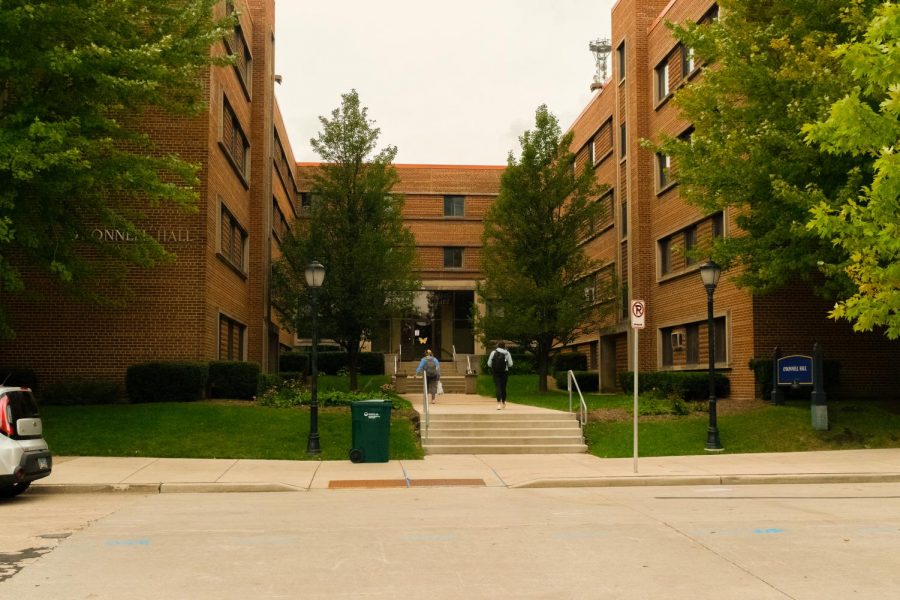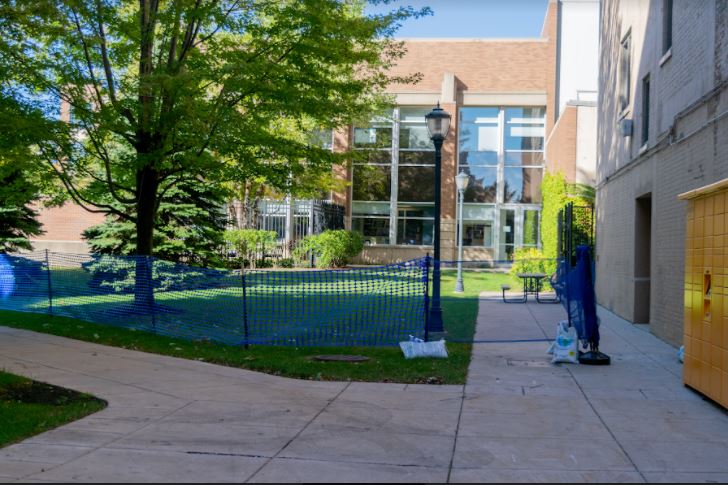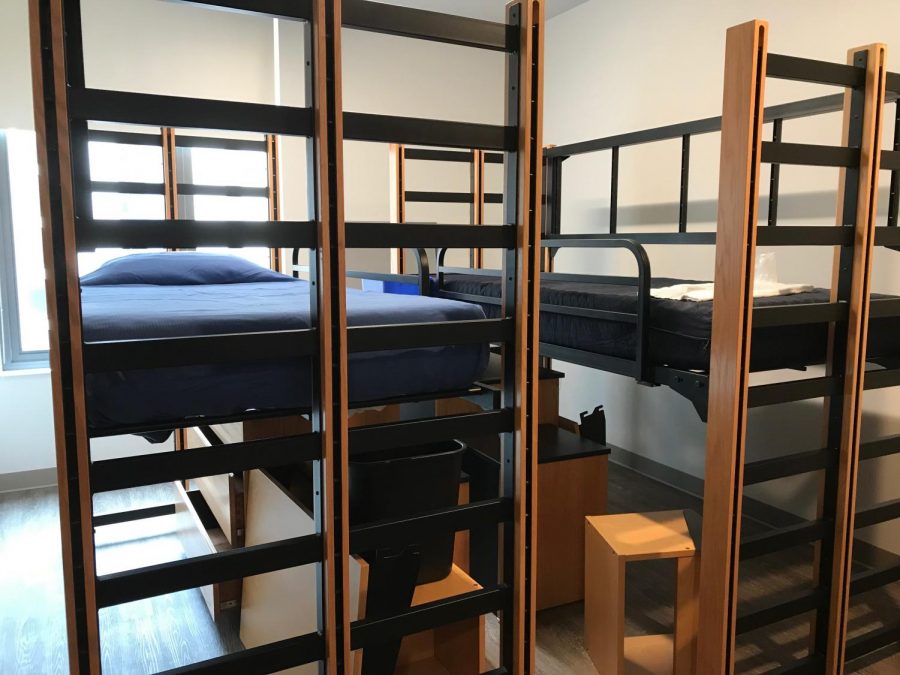 It’s 2 a.m. on a Thursday and you are just getting back to your dorm after a long study session for your 8 a.m. test. You approach the door, only to be greeted by a sock on the doorknob. You know what this means — you have been “sexiled.”
It’s 2 a.m. on a Thursday and you are just getting back to your dorm after a long study session for your 8 a.m. test. You approach the door, only to be greeted by a sock on the doorknob. You know what this means — you have been “sexiled.”
Residence hall policy set by the Office of Residence Life states students cannot check in members of the opposite sex overnight. This policy is in place to prevent aforementioned awkward situations, but also more serious ones.
Students were able to have overnight guests of the opposite sex from 1992 to 1994. But the policy was changed — partly because of an increase in reports of sexual assault.
The policy was revisited again in the 1999-’00 school year, but the group of students and staff members working with the policy could not find significant support to switch back to allowing opposite-sex overnight stays, according to Jim McMahon, assistant vice president and dean of Residence Life.
[kml_flashembed publishmethod=”static” fversion=”8.0.0″ movie=”http://marquettetribune.org2009/11/Map.swf” width=”400″ height=”300″ targetclass=”flashmovie”]
[/kml_flashembed]
Reported sexual assault increase
According to a memo sent to all residence hall staff members, when the more lenient policy was put into effect, there was an “inordinate number of reported cases of assault, usually associated with men and women who may have just met that evening, being together late in a student’s room.”
The Department of Public Safety’s records reflect an increase of reported sexual assaults from 1993 to 1994. In 1991, there were no reported sexual offenses, according to the Department of Public Safety’s end of the year report. There were three reports in 1992 and two in 1993. There were seven reported sexual offenses in 1994, four of which were sexual assault. In 1995, there were two reports of sexual offenses.
Captain Russel Shaw, associate director of DPS said these numbers are not specific to where these crimes occurred, whether on campus or in a residence hall or somewhere else.
But according to McMahon, the number of students who approached residence hall staff with fears they had been sexually assaulted did increase when the policy was relaxed. These students were always directed to DPS, but whether they chose to report the crimes was up to them.
McMahon also said many students in these situations were under the influence of alcohol. He said it was “often a matter of different expectations” between the parties involved.
“There were a lot of students who were sleeping in the (resident assistants’) room, sleeping in the lounges because their roommate was entertaining someone,” McMahon said.
Disastrous changes
While students call for more freedom within the visitation policy, past experiences have shown to be “a disaster.”
The visitation policy change in 1992 came because students called for a more lenient policy said Rick Arcuri, associate dean of Residence Life. He said many students thought the policy was too restrictive and would like more freedom.
“It was very quiet at first as people tested the new policy out,” Arcuri said. “Within a couple of months, it was clear that it was a disaster.”
Arcuri said after the change to a more liberal policy, many buildings were past capacity on the weekends and many residents were voicing complaints about disruptions. McMahon added that many students were feeling “sexiled” from their rooms.
The number of students who asked for an exemption from the requirement to live on campus because a disruptive atmosphere in the dorms increased significantly when the policy was changed, McMahon said.
“Our conclusion was that we really needed to … eliminate overnight visitation by members of the opposite sex,” McMahon said.
The positive impact on life in the residence halls after the current visitation policy was reinstated in 1994 was almost immediate, said Arcuri. The traffic of people moving in and out of dorms lessened and so did the numbers of roommate conflicts voiced to ORL.
“It was very disappointing to find out that it couldn’t be managed in the way we had put it together,” Arcuri said.
Then and now
Steve Blaha, an alumnus who currently works in Campus Ministry, was an RA in McCormick Hall from 1993 to 1995.
Blaha said students who were freshmen in the first year of the current policy were respectful of the visitation restrictions. But those who were sophomores when the more lenient visitation policy was revoked were outraged, feeling the regulations were trying to control students’ sexual decisions.
But Blaha said that wasn’t at all what the university aimed for with the policy change. Rather, reverting back to the old policy was intended to ensure all students living in the residence halls were as safe and comfortable as possible, he said.
Dan Statter, a junior in the College of Business Administration and a desk receptionist in Cobeen, said he was surprised by the past decision to loosen the visitation policy.
“I was kind of encouraged that the administration, at least at one point, had gone into research or at least looked into whether the policy was actually effective or if it was just there because some higher-up wanted it there,” Statter said.
But he added that he was unsure whether the current policy makes students safer.
“You could argue that, by making students leave by one or two o’clock and having them walk back to the dorms can make them more susceptible, especially if they’re under the influence of alcohol.”
Quinn Gower, a freshman in the College of Business Administration who lives in McCormick, was surprised to hear the visitation restrictions were made more restrictive in 1994.
“We’ve moved forward in time, that doesn’t seem like progress,” Gower said.
Gower said he understood why the policy is in place the way it is today, but he still feels it is fairly strict.
Elizabeth Leighton, a freshman in the College of Health Sciences who also lives in McCormick, said she sometimes gets frustrated with certain aspects of the policy like check-in procedures for people who aren’t residents of a particular dorm. But she said she understands that the policy is in effect for students’ safety.
“Obviously rules are rules, you can’t really make exceptions for one person because then you have to make exceptions for everybody,” Leighton said.
“It’s pretty strict … which is understandable,” she added, “but I think that a lot of people would like it more if it were more lenient.”
Erin Nelson, a freshman in the College of Arts & Sciences, said she doesn’t think the new policy is any safer than the old one.
“I lock my door at night and I’m aware of my surroundings … I wouldn’t feel any less safe than I do now (if the policy was less strict),” Nelson said.
Revisiting revisitation
In 1999 when the visitation policy was revisited, ORL had the most trouble defining the purpose of visitation because it has different meanings for different people, McMahon said.
“For some, it was about the ability to study with your friends past two o’clock. For some it was about socializing,” McMahon said. “For some, it was a right that they were owed because they were 18. They were adults and could make adult decisions. For some it was about sex, for some it was about our Catholic, Jesuit character.”
The proposed policy change was taken to RHA, MUSG, Student Affairs and Campus Ministry, but none of these groups felt they could support the recommendation as it was written, McMahon said.
“Nobody could find a way to craft a policy that was different than what we had that would satisfy the various constituents,” McMahon said.
McMahon said the current visitation policy helps create an atmosphere that allows students to grow personally and academically. He said living in a residence community with fellow students is an integral part of life as a student at Marquette.
But ORL still hears complaints from students who disagree with the visitation policy.
“I tell students sometimes, you have to be careful what you ask for, because what you think is going to happen and what might really happen can be very different things,” McMahon said. “I believe that we would displease as many students by allowing overnight visitation as those we would be satisfying, so you’re just flipping the equation.”



